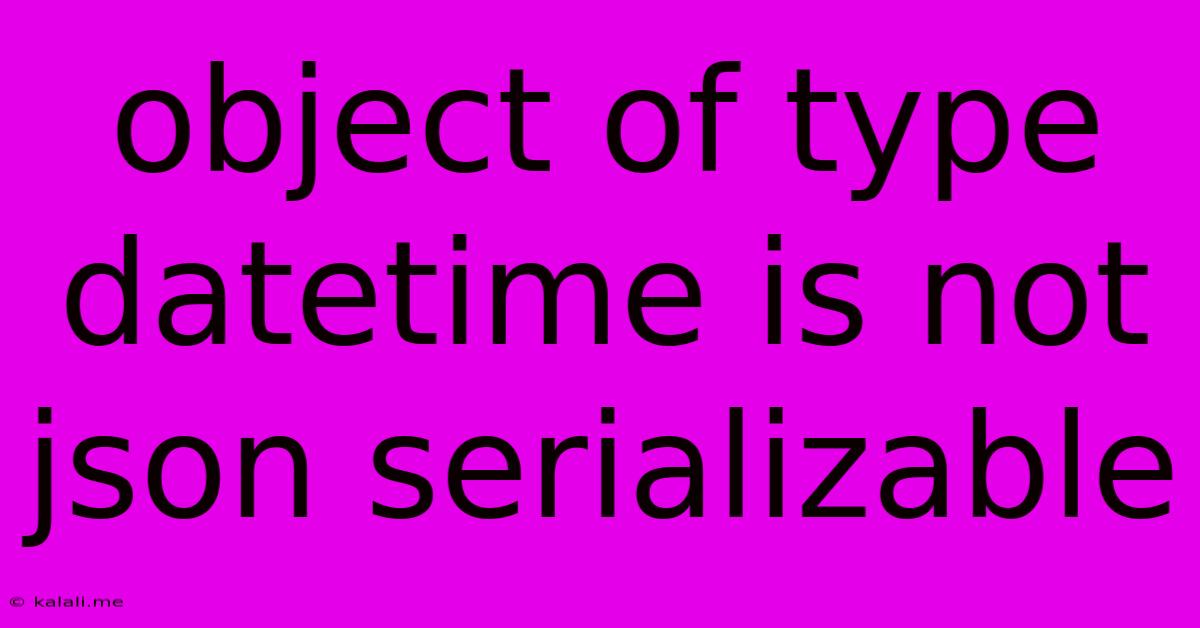Object Of Type Datetime Is Not Json Serializable
Kalali
May 20, 2025 · 3 min read

Table of Contents
Decoding the "Object of Type Datetime is not JSON Serializable" Error
The dreaded "Object of type datetime is not JSON serializable" error is a common headache for Python developers working with JSON data. This error arises when you try to convert a Python datetime object (or a similar date/time object) directly into a JSON string. JSON, a lightweight data-interchange format, doesn't have a native representation for datetime objects. This comprehensive guide will walk you through understanding the error, its causes, and effective solutions. This article will cover various methods, from simple modifications to advanced techniques, ensuring you can handle datetime objects in your JSON workflows seamlessly.
This error typically occurs when you're using libraries like json.dumps() to serialize Python dictionaries or lists containing datetime objects into JSON format for storage, transmission, or interaction with APIs. Understanding this limitation and employing appropriate strategies is crucial for robust data handling.
Understanding the Root Cause
The core issue lies in the fundamental difference between Python's datetime objects and JSON's data types. JSON supports basic data types like strings, numbers, booleans, and lists/dictionaries. The datetime object, however, is a complex data structure specific to Python. Direct conversion attempts result in the "Object of type datetime is not JSON serializable" error.
Effective Solutions and Workarounds
Here are several ways to overcome this common problem:
1. Converting datetime objects to strings: This is the simplest and often most effective approach. You can convert your datetime objects to ISO 8601 format strings, which are easily parsed and understood by many systems and libraries.
import json
from datetime import datetime
my_datetime = datetime.now()
data = {'timestamp': my_datetime.isoformat()}
json_data = json.dumps(data)
print(json_data)
This method neatly converts the datetime object into a string representation, avoiding the serialization error. Remember that the receiving end will need to parse this string back into a datetime object.
2. Using default in json.dumps(): This allows you to customize how specific objects are handled during serialization. You can provide a function to the default argument that handles datetime objects specifically.
import json
from datetime import datetime
def date_handler(obj):
if isinstance(obj, datetime):
return obj.isoformat()
raise TypeError("Object of type '%s' is not JSON serializable" % type(obj).__name__)
my_datetime = datetime.now()
data = {'timestamp': my_datetime}
json_data = json.dumps(data, default=date_handler)
print(json_data)
This method offers more control and flexibility if you need to handle other non-serializable types. The date_handler function explicitly converts datetime objects; otherwise, it raises a TypeError for other unsupported types, ensuring error clarity.
3. Using a dedicated library: arrow or dateutil: Libraries such as arrow and python-dateutil provide more sophisticated date and time manipulation capabilities. They often have built-in JSON serialization support or make it easier to format your dates into a JSON-compatible format. While not strictly necessary for this specific error, these libraries enhance overall date/time handling in Python.
4. Using a custom encoder: For more complex scenarios or large datasets, creating a custom JSON encoder might be beneficial. This involves subclassing json.JSONEncoder and overriding the default() method to handle datetime objects and other custom types. This approach enhances maintainability and flexibility in larger projects.
Choosing the Right Approach
The optimal solution depends on your specific needs and context:
- For simple cases, converting
datetimeto an ISO 8601 string using.isoformat()is sufficient. - For more complex scenarios involving multiple non-serializable types, the
defaultargument with a custom handler provides more control. - For enhanced date/time handling and potentially smoother JSON integration, consider libraries like
arrowordateutil. - For large-scale projects with extensive custom types, implementing a custom JSON encoder offers the most robust and maintainable solution.
By implementing one of these solutions, you can effectively resolve the "Object of type datetime is not JSON serializable" error and ensure smooth handling of date and time information within your JSON workflows. Remember to choose the method best suited for your project's complexity and maintainability requirements.
Latest Posts
Latest Posts
-
What Is A Quarter Of A Million
Jul 02, 2025
-
Which Of The Following Is True Concerning A Dao
Jul 02, 2025
-
How Long Can Catfish Live Out Of Water
Jul 02, 2025
-
Is Kanye West Related To Cornel West
Jul 02, 2025
-
Olivia Needs To Provide A Visual Summary
Jul 02, 2025
Related Post
Thank you for visiting our website which covers about Object Of Type Datetime Is Not Json Serializable . We hope the information provided has been useful to you. Feel free to contact us if you have any questions or need further assistance. See you next time and don't miss to bookmark.